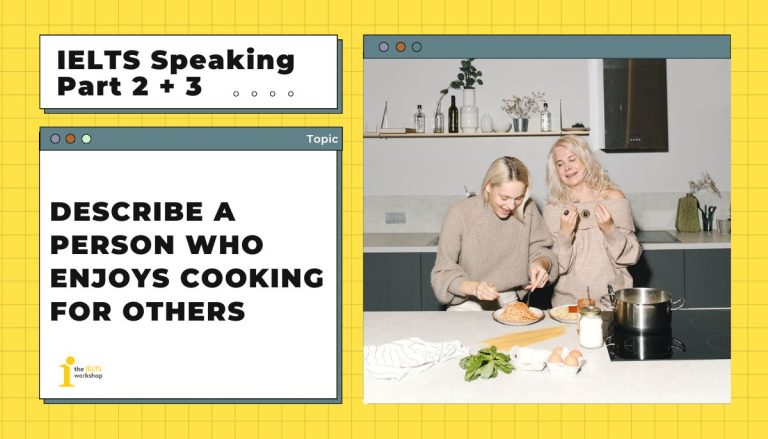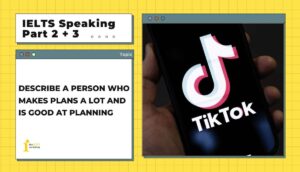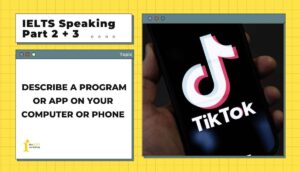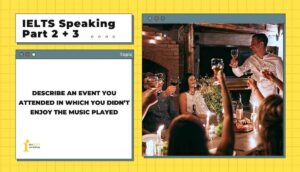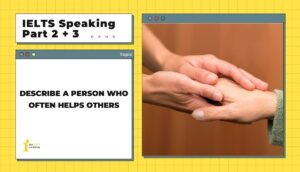Trong chuyên mục giải đề dưới đây, cô Khánh Huyền của The IELTS Workshop HN sẽ hướng dẫn bạn trả lời topic “Describe a person who enjoys cooking for others“ trong IELTS Speaking Part 2. Cùng tham khảo sample, từ vựng và một vài cách diễn đạt ghi điểm trong phần thi IELTS Speaking nhé.
Part 2: Describe a person who enjoys cooking for others
Describe a person who enjoys cooking for others
You should say:
Who this person is
What he/she likes to cook
Who he/she cooks for
And explain why he/she enjoys cooking
Dưới đây là bài mẫu cho topic “Describe a person who enjoys cooking for others“.
1. Bài mẫu (Sample)
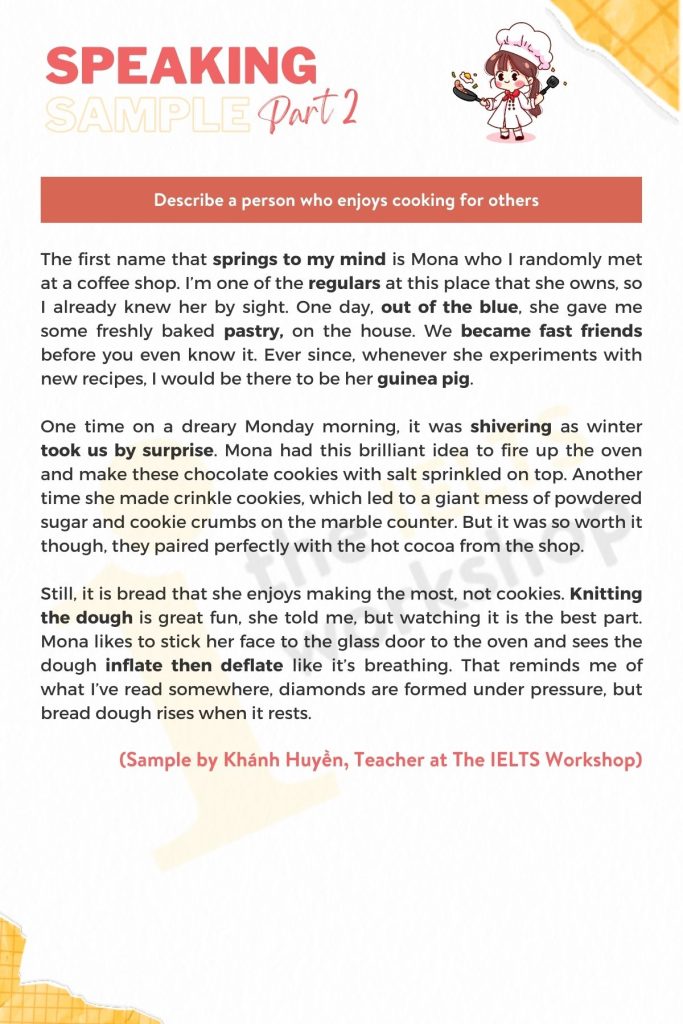
2. Từ vựng (Vocabuary)
- to spring to my mind: chợt nhớ ra, nảy lên trong đầu
- regular: khách quen
- out of the blue: bất ngờ
- pastry: bánh ngọt
- become fast friends: trở thành bạn
- guinea pig: chuột thí nghiệm
- shivering: (thời tiết) rét
- take somebody by surprise: làm ai bất ngờ
- knit dough: nhào bột
- inflate: phồng lên
- deflate: xẹp xuống
Part 3
1. What do we need to prepare when we need to cook?
2. Do you agree that food is an important part of festivals and ceremonies?
3. Which dishes are a must at festivals?
4. Should students learn to cook at school?
5. Do you think cooking should be a compulsory or an elective course? Why?
6. Are there any differences between cooking today and in the past?
1. What do we need to prepare when we need to cook?
Ourselves. From my personal experience, cooking is no easy game. You see, when you’re in the kitchen, you work with lots of sharp blades and high heat, which means you run the risk of hurting yourself. So, culinary is in fact, an intricate blend of chemistry and martial arts.
- to prepare oneself: chuẩn bị tinh thần
- blade: lưỡi dao
- to run the risk of something: có nguy cơ gì
- culinary: ngành ẩm thực
- intricate: tinh vi, tinh xảo
2. Do you agree that food is an important part of festivals and ceremonies?
Of course. If you really think about it, most of those events stemmed from celebrations or in expectation of a successful crop yield. Say, in most Eastern countries, we use the newly harvested produce to make a variety of dishes and enjoy them together. A prime example of this is the Mid-autumn festival, during which Vietnamese people use the bountiful rice to make cốm and share persimmons along other fruits.
- to stem from: khởi nguồn từ đâu
- Mid-autumn festival: Lễ hội Trung thu
- bountiful: dồi dào, bội thu
3. Which dishes are a must at festivals?
If you ask any Vietnamese, I bet they would say spring rolls.
We have them during the Lunar New Year holiday, we have them at anniversaries, we have them when there is an union of all kinds.
It’s just such a versatile dish, you know.
- Lunar New Year: Tết Âm lịch
- versatile: đa dạng
4. Should students learn to cook at school?
I suppose that would be a good way to ensure that everyone is equipped with this absolutely essential skill. You can’t always expect their families to help them learn how to cook, considering they come from a wide range of backgrounds.
Still, a cooking course would create a strain on the school’s facilities and fundings, not to mention the safety aspect. I suppose that’s why high school students here are required to take a cooking class provided by a third party.
- to be equipped with: được chuẩn bị trước
- to create a strain on smt: gây tổn
5. Do you think cooking should be a compulsory or an elective course? Why?
A beginner level should be mandatory for teenagers to ensure that they can take care of themselves. From the way I see it, this experience can help them discover a new interest. And then higher levels of training can be optional.
6. Are there any differences between cooking today and in the past?
I would say the stark difference is the tools. Technology has evolved from open fire to self-timing induction stoves, which is life-changing. Another aspect is hygiene. I’m relieved to say it has come a long way.
- induction stove: bếp từ
- hygiene: sự sạch sẽ
Bài mẫu bởi cô Khánh Huyền – Giáo viên The IELTS Workshop HN
Trên đây là bài mẫu cho topic: Describe a person who always has interesting ideas. Các bạn có thể tham khảo các bài mẫu IELTS Speaking khác của The IELTS Workshop cũng như làm bài test trình độ IELTS tại đây, từ đó đề ra cho mình lộ trình ôn luyện chuẩn xác nhất nhé!
Để có thể học và nắm được phương pháp xây dựng câu trả lời cho phần thi IELTS Speaking Part 3, tham khảo ngay Khóa bổ trợ từng kỹ năng IELTS chuyên sâu của The IELTS Workshop.

